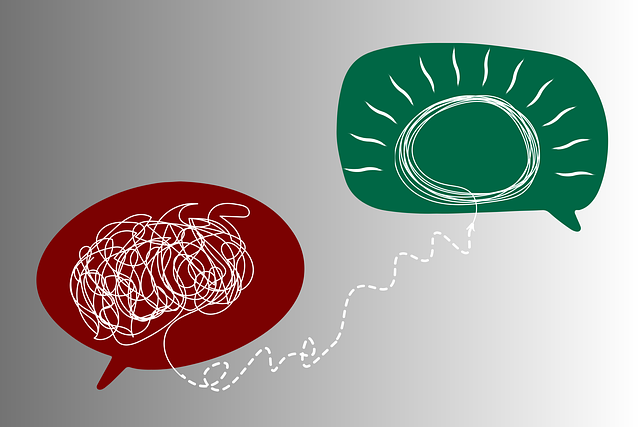Aurora Anger Management Therapy empowers Crisis Intervention Teams (CITs) through evidence-based training, focusing on anger management and de-escalation techniques. This program enhances CIT members' communication, empathy, and cultural sensitivity, enabling them to handle high-risk scenarios effectively. By reducing crisis escalations and promoting positive outcomes, Aurora Anger Management Therapy contributes to mental health stigma reduction and community safety. Successful CIT programs, like this therapy, lead to improved public awareness, better risk assessment, and reduced emergency room visits, serving as a model for revolutionizing mental health crisis response.
Crisis Intervention Team (CIT) training programs are essential resources for communities, equipping members to handle emergencies effectively. This article explores the critical role of specialized programs in fostering resilient and competent CIT teams. We delve into the contributions of Aurora Anger Management Therapy, highlighting its impact on honing crisis response skills. Additionally, it examines key training components, emphasizes the importance of empathetic and culturally competent learning environments, and discusses evaluation methods to ensure the effectiveness of CIT preparation.
- Understanding Crisis Intervention Teams: A Vital Resource in Times of Emergency
- The Role of Aurora Anger Management Therapy in Training Effective CIT Members
- Essential Skills and Strategies for Crisis Intervention Team Training Programs
- Creating a Supportive Learning Environment: Fostering Empathy and Cultural Competence
- Evaluating and Measuring the Impact: Assessing the Effectiveness of CIT Training
Understanding Crisis Intervention Teams: A Vital Resource in Times of Emergency

In times of emergency or sudden crises, having a dedicated team ready to step in and provide immediate support can make all the difference. This is where Crisis Intervention Teams (CITs) come into play—a vital resource for communities worldwide. CITs are composed of specially trained individuals from diverse backgrounds, including mental health professionals, law enforcement officers, and community leaders. Their primary role is to de-escalate high-risk situations, offer immediate crisis support, and connect individuals with long-term care options.
With the growing emphasis on mental wellness and conflict resolution techniques, CITs are becoming increasingly important. Aurora Anger Management Therapy, for instance, has recognized the value of these teams in managing anger-related crises effectively. By training individuals to recognize warning signs and provide early intervention, CITs can prevent escalation and promote positive outcomes. Additionally, incorporating self-care routine development for better mental health into their strategies ensures that both the crisis interveners and those they support receive the necessary tools to navigate challenging situations successfully.
The Role of Aurora Anger Management Therapy in Training Effective CIT Members

Aurora Anger Management Therapy plays a pivotal role in equipping individuals to become effective members of Crisis Intervention Teams (CITs). This specialized therapy delves into the root causes of anger, providing participants with valuable tools and strategies for managing intense emotions during high-pressure situations. By focusing on emotional regulation, communication skills, and conflict resolution techniques, Aurora Anger Management Therapy empowers CIT members to respond calmly and effectively when faced with crises.
Incorporating mindfulness meditation and social skills training within the program further enhances these professionals’ ability to navigate complex scenarios. Public Awareness Campaigns Development also benefits from this approach, as a well-trained CIT can de-escalate situations, promote understanding, and foster better outcomes for all involved. This holistic training ensures that crisis intervention team members are not just equipped with technical skills but also possess the emotional intelligence needed to create safer, more supportive communities.
Essential Skills and Strategies for Crisis Intervention Team Training Programs

Effective crisis intervention team training programs equip members with crucial skills and strategies to handle high-pressure situations. At the core, these programs focus on enhancing communication strategies, fostering empathy, and promoting de-escalation techniques. Trainees learn to recognize early warning signs of potential crises, enabling them to intervene promptly and prevent escalating issues.
Incorporating elements like Aurora Anger Management Therapy can significantly contribute to reducing the Mental Illness Stigma Reduction Efforts within teams. By understanding the underlying causes of distress and anger, healthcare providers gain cultural competency training, allowing them to respond sensitively and effectively. These programs prioritize open dialogue, active listening, and non-judgmental attitudes, all vital components for successful crisis intervention.
Creating a Supportive Learning Environment: Fostering Empathy and Cultural Competence

Creating a supportive learning environment is paramount in crisis intervention team training programs. This involves cultivating an atmosphere where participants feel safe to express their thoughts and emotions openly, fostering empathy and cultural competence. Effective training should encourage active listening, understanding, and respect for diverse perspectives, reflecting the intricate tapestry of human experiences. By promoting cultural sensitivity in mental healthcare practice, teams can better navigate complex situations, ensuring they address the unique needs of every individual.
In this context, programs like Aurora Anger Management Therapy play a crucial role in enhancing public awareness campaigns development and risk management planning for mental health professionals. Through interactive workshops and practical scenarios, trainees learn to recognize and manage emotional responses during crises, incorporating cultural competence to avoid inadvertent biases. This holistic approach not only prepares teams for real-world challenges but also promotes effective communication, ensuring every member of the community receives sensible, respectful, and timely assistance.
Evaluating and Measuring the Impact: Assessing the Effectiveness of CIT Training

Evaluating the impact of Crisis Intervention Team (CIT) training programs is paramount to understanding their effectiveness in enhancing mental health support systems. Beyond mere knowledge retention, successful CIT training should translate into improved outcomes for both citizens and professionals. One key metric is the reduction in adverse events related to mental health crises following implementation. This includes measures like decreased instances of physical restraint, fewer emergency room visits, and lower rates of recurrence among those with a history of severe mental illness.
The success of CIT training can also be gauged through public awareness campaigns development and enhanced risk assessment capabilities for mental health professionals. Programs that equip responders with evidence-based techniques for de-escalation and crisis resolution contribute to fostering communities that prioritize Mental Health Awareness. As the impact of CIT training is meticulously assessed, cities like Aurora Anger Management Therapy’s focus on such programs can become models for other regions seeking to revolutionize their response to mental health crises.
Crisis Intervention Team (CIT) training programs, enriched by specialized therapists like Aurora Anger Management Therapy, play a pivotal role in equipping individuals to handle emergencies effectively. By focusing on essential skills, fostering empathy, and promoting cultural competence, these programs empower participants to offer critical support during crises. Evaluating their impact is crucial for continuous improvement, ensuring that CIT members are well-prepared to make a lasting difference in their communities.








